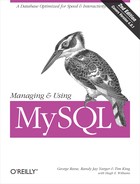Name
mysql_use_result —
Synopsis
MYSQL_RES *mysql_use_result(MYSQL *mysql)
Reads
the result of a query row by row and allows access to the data
through a MYSQL_RES structure. Either this
function or mysql_store_result must be called to
access return information from a query. Because this function does
not read the entire data set all at once, it is faster and more
memory efficient than mysql_store_result. However,
when using this function, you must read all the rows of the data set
from the server or else the next query will receive the leftover
data. Also, you cannot run any other queries until you are done with
the data in this query. Even worse, no other threads running on the
server can access the tables used by the query until you are
finished. For this reason, you should use this function only when you
are certain you can read the data in a timely manner and release it.
You must call mysql_free_result to free the
MYSQL_RES structure when you are done with it.
The function returns a null value in the case of an error. The
function also returns a null value if the query was not of a type
that returns data (such as an INSERT or
UPDATE query). If you receive a null pointer and
are not sure if the query was supposed to return data or not, you can
call mysql_field_count to find the number of
fields the query was supposed to return. If zero, then it was a
non-SELECT statement, and the pointer should be
null. Otherwise, an error has occurred.
If the query was a SELECT-type statement, but
happens to contain no data, this function still returns a valid (but
empty) MYSQL_RES structure; i.e., it does not
return a null pointer.
